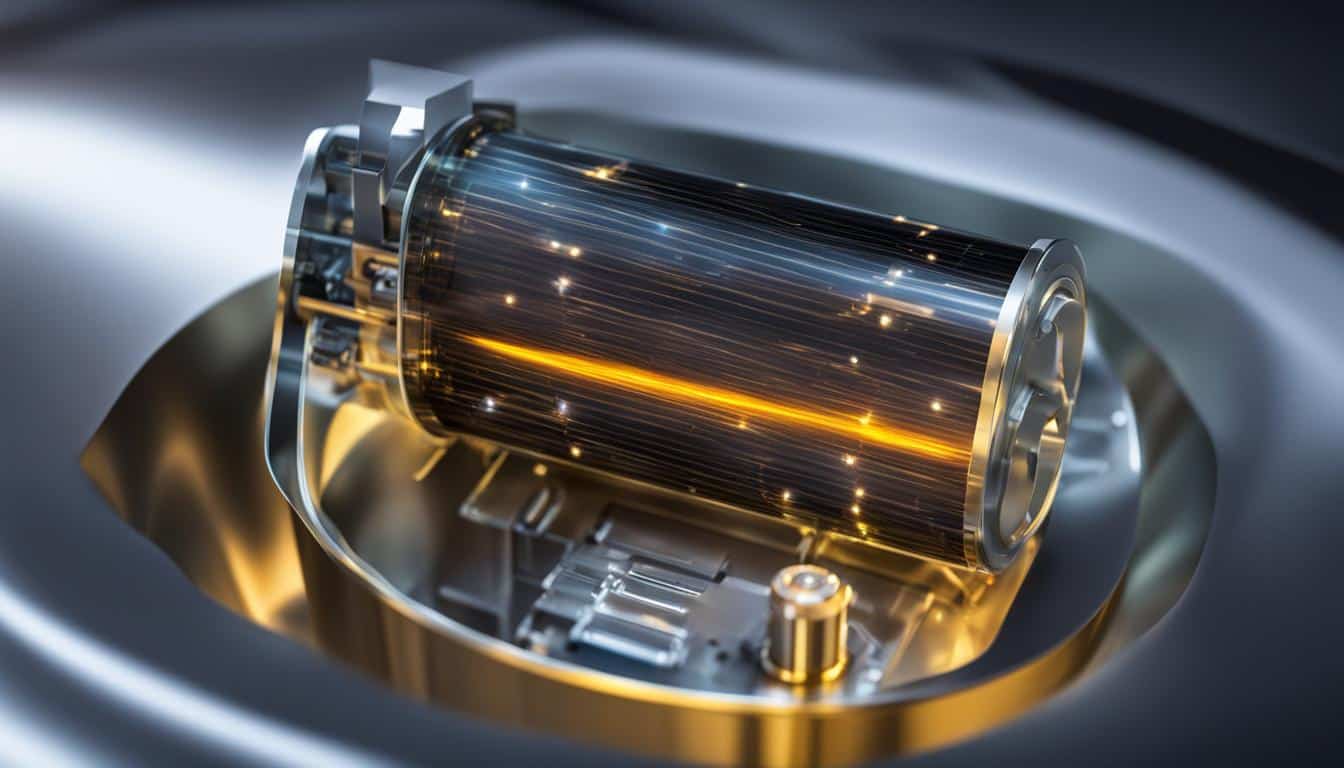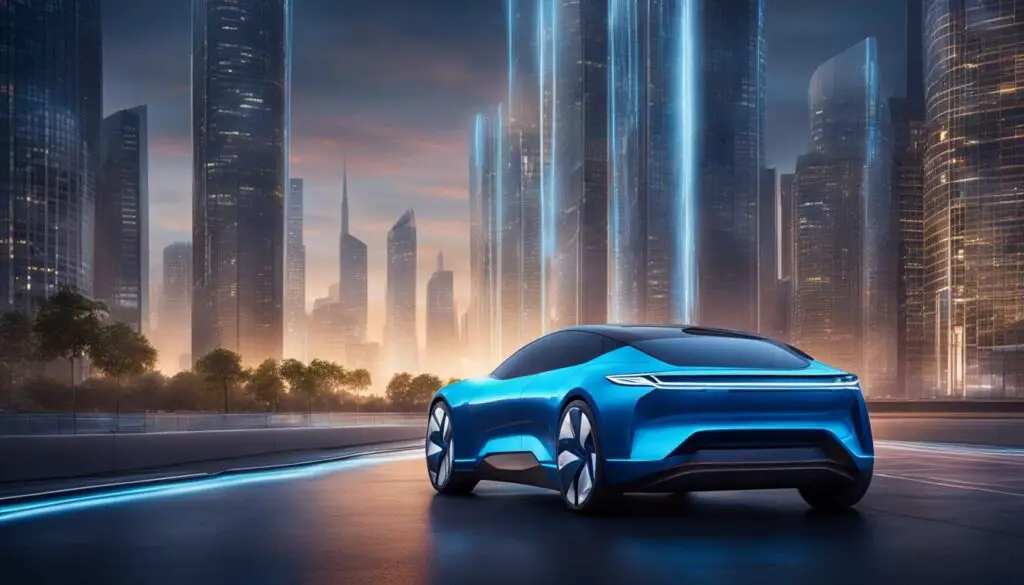
The Next Leap in EVs: Battery Technology Advancements
Battery technology advancements are driving the future of sustainable transportation, particularly in the electric vehicle (EV) industry. Ongoing research and development efforts are making EV batteries more efficient, longer-lasting, and faster to charge, overcoming range anxiety and increasing the adoption of electric vehicles worldwide.
Key Takeaways:
- Battery technology advancements are crucial in overcoming range anxiety and increasing the adoption of electric vehicles worldwide.
- Advancements in battery technology directly impact factors such as range, charging speed, energy density, and longevity, making EVs more practical and competitive.
- The current trends in battery technology for EVs revolve around improving lithium-ion batteries and exploring solid-state batteries.
- Breakthroughs in battery chemistry are revolutionizing the capabilities of EV batteries, offering higher energy storage capacity and faster charging.
- The development of EV charging infrastructure is essential to support the growing fleet of electric vehicles and optimize the charging process.
The Importance of Battery Technology Advancements in EVs
Electric vehicle batteries are the backbone of the electric vehicle industry, playing a crucial role in its growth and adoption. Technological advancements in battery technology have the power to transform the landscape of sustainable transportation, making electric vehicles more practical, efficient, and competitive with traditional internal combustion engine vehicles.
Advancements in electric vehicle batteries directly impact key factors that determine their performance and viability. These include:
- Range: By improving battery technology, electric vehicles can achieve longer ranges, alleviating range anxiety and making them more comparable to traditional vehicles.
- Charging Speed: Faster charging capabilities mean less time spent charging and more time on the road, making electric vehicles more convenient and user-friendly.
- Energy Density: Higher energy density allows for greater storage capacity in electric vehicle batteries, enabling longer drives and reducing the need for frequent charging.
- Longevity: Advancements in battery technology can significantly improve the lifespan of electric vehicle batteries, reducing the need for frequent replacements and lowering overall costs.
By addressing these aspects, advancements in battery technology make electric vehicles a more attractive and viable option for consumers. As the technology continues to evolve, electric vehicles will not only match the performance of traditional vehicles but also surpass them in terms of efficiency and environmental impact.
Driving the Transition to Sustainable Transportation
Efficient and reliable electric vehicle batteries are fundamental to the transition to a more sustainable transportation system. The advancements in battery technology allow for reduced reliance on fossil fuels, leading to a significant decrease in greenhouse gas emissions and air pollution. Additionally, the increasing demand for electric vehicles puts pressure on manufacturers and researchers to innovate and improve battery technology, fostering a continuous cycle of advancements and progress.
As electric vehicle batteries become more efficient and reliable, the barriers to widespread electric vehicle adoption are gradually being eliminated. The development of sustainable transportation infrastructure, including an extensive network of charging stations, is already underway. This infrastructure supports the growing fleet of electric vehicles and provides reassurance to consumers, further driving the transition to sustainable transportation.
Advancements in Electric Vehicle Battery Technology
| Advancement | Benefits |
|---|---|
| Lithium-Ion Batteries | Improved energy density and longer-lasting performance |
| Solid-State Batteries | Increased energy storage capacity, faster charging, and improved safety |
| Lithium-Sulfur Batteries | Potential for higher energy storage capacity |
| Graphene-Based Batteries | Fast charging, prolonged lifespan, and enhanced performance |
The advancements in electric vehicle battery technology showcased in the table above illustrate the ongoing progress in the industry. These advancements not only improve the performance of electric vehicles but also contribute to a more sustainable future by reducing carbon emissions and environmental impact.
Current Trends in Battery Technology for EVs
The electric vehicle (EV) industry is constantly evolving, and one area that is driving significant change is battery technology. To meet the growing demand for EVs and address the challenges of range, charging time, and cost, researchers and engineers are continuously exploring new trends and innovations. In this section, we will explore the current trends in battery technology for EVs, focusing on the advancements in lithium-ion batteries and the emergence of solid-state batteries.
The Dominance of Lithium-Ion Batteries
For years, lithium-ion batteries have been the go-to choice for powering EVs. They have proven to be reliable, efficient, and capable of providing the necessary range for everyday driving. However, there is still room for improvement, especially in terms of energy density and cost reduction.
Efforts are underway to enhance lithium-ion battery technology by increasing energy density, allowing for longer driving ranges without sacrificing performance. By packing more energy into a smaller space, EVs can go farther on a single charge, alleviating range anxiety for drivers. Additionally, reducing the cost of lithium-ion batteries is crucial to make EVs more accessible to a wider audience.
The Rise of Solid-State Batteries
While lithium-ion batteries have been the industry standard, solid-state batteries are emerging as a potential game-changer. Solid-state batteries offer several advantages over their lithium-ion counterparts, including increased energy storage capacity, improved safety, and faster charging times.
One of the key benefits of solid-state batteries is their higher energy storage capacity. This means that EVs equipped with solid-state batteries can travel greater distances on a single charge, improving convenience and reducing the need for frequent recharging. Solid-state batteries also offer improved safety due to their solid electrolyte, which reduces the risk of thermal runaway incidents.

Moreover, solid-state batteries have the potential for faster charging times, enabling EV owners to quickly recharge their vehicles and get back on the road. This addresses one of the major concerns of EV adoption – the time it takes to charge a vehicle compared to refueling a conventional gasoline car.
Overall, the development of solid-state batteries is an exciting breakthrough in EV battery technology. While there are still challenges to overcome, such as production scalability and cost reduction, solid-state batteries hold great promise and represent a significant trend in the EV industry.
Comparison of Lithium-Ion Batteries and Solid-State Batteries
| Characteristic | Lithium-Ion Batteries | Solid-State Batteries |
|---|---|---|
| Energy Storage Capacity | High | Higher |
| Safety | Good | Improved |
| Charging Time | Standard | Faster |
| Cost | Reducing | Challenges |
This table provides a concise comparison of lithium-ion batteries and solid-state batteries, highlighting the key characteristics that differentiate the two technologies. It is clear that solid-state batteries offer advantages in terms of energy storage capacity, safety, and charging time. However, the cost of production and scalability remain challenges that need to be addressed.
As research and development efforts continue, both lithium-ion and solid-state batteries are expected to undergo further refinements and advancements. These current trends in battery technology are driving the future of EVs, providing solutions for enhanced range, faster charging times, and a more sustainable transportation system.
Breakthroughs in Battery Chemistry for EVs
Breakthroughs in battery chemistry are revolutionizing the capabilities of EV batteries. Researchers are tirelessly exploring new materials and compositions that have the potential to enhance energy density, stability, and overall performance. These advancements in battery chemistry hold immense promise for the future of electric vehicles, as they are key to overcoming current limitations and accelerating the transition to sustainable transportation.
One notable breakthrough in battery chemistry involves lithium-sulfur batteries. These batteries offer the potential for significantly higher energy storage capacity compared to traditional lithium-ion batteries. By utilizing sulfur as the cathode material, lithium-sulfur batteries can store more energy per unit weight, leading to increased driving range for electric vehicles.
“The development of lithium-sulfur batteries marks a significant milestone in EV battery technology. This breakthrough has the potential to transform the electric vehicle industry by addressing one of the primary concerns – range anxiety.”
Another promising advancement is the use of graphene-based batteries. Graphene, being a single layer of carbon atoms arranged in a hexagonal lattice, possesses exceptional electrical conductivity and mechanical strength. This unique characteristic enables graphene-based batteries to deliver faster charging times and a prolonged lifespan, making them a compelling option for electric vehicle applications.
These breakthroughs in battery chemistry not only enhance energy storage capabilities but also pave the way for a more sustainable and efficient future. By harnessing the potential of innovative materials and compositions, researchers are driving the evolution of EV battery technology, contributing to a greener transportation system and reducing dependence on fossil fuels.

With ongoing advancements in battery chemistry, the EV industry is poised for significant transformation. These breakthroughs offer a promising outlook for electric vehicle batteries, addressing critical challenges and unlocking new possibilities for energy storage in sustainable transportation.
Charging Infrastructure and Battery Technology
The advancement of battery technology goes hand in hand with the development of EV charging infrastructure. Fast-charging capabilities and an extensive network of charging stations are crucial to alleviate range anxiety and provide convenience to EV owners. Innovations in battery technology, such as faster charging times and increased range, necessitate the expansion and improvement of charging infrastructure to support the growing fleet of electric vehicles. The integration of smart grid technologies and renewable energy sources also play a role in optimizing the charging process and reducing the environmental impact.
Importance of Fast Charging
Fast charging is a critical component of the EV charging infrastructure, enabling EV owners to quickly recharge their vehicles and resume their journeys. With faster charging times, EVs become more practical and competitive with traditional gasoline-powered vehicles, addressing concerns of long charging waits and limited range. By investing in fast-charging technology and expanding the network of fast-charging stations, charging infrastructure providers can significantly enhance the convenience and usability of electric vehicles.
Extending Battery Range
Battery range is another key factor in the development of charging infrastructure. As battery technology improves and allows for increased range, the need for charging stations becomes even more vital. Extending battery range reduces range anxiety, a common concern for potential EV buyers, and promotes long-distance travel without the fear of running out of charge. By strategically deploying charging stations along highways, in urban centers, and at popular destinations, stakeholders can ensure seamless travel experiences for EV users.
To further optimize the charging process and reduce the environmental impact, integrating EV charging infrastructure with renewable energy sources is crucial. By harnessing power from solar panels or wind turbines, charging stations can reduce reliance on the grid and rely on clean, sustainable energy for charging EVs. This integration not only contributes to a greener transportation system but also helps alleviate strain on the electrical grid, making the charging process more resilient and sustainable.
| Benefits of Charging Infrastructure and Battery Technology Integration |
|---|
| 1. Alleviates range anxiety and promotes EV adoption |
| 2. Enhances convenience and usability of electric vehicles |
| 3. Enables long-distance travel without the fear of running out of charge |
| 4. Reduces reliance on the electrical grid and promotes renewable energy usage |
With the advancement of battery technology and the expansion of charging infrastructure, the future of electric vehicles looks promising. As we continue to improve fast-charging capabilities, extend battery range, and integrate with renewable energy sources, EVs will become more practical, sustainable, and attractive to consumers.
Future Prospects of Battery Technology for EVs
The future prospects of battery technology for electric vehicles (EVs) hold immense promise in shaping the future of sustainable transportation and energy storage. With continued research and development efforts, we anticipate significant advancements in energy density, longevity, and charging speed.
One exciting avenue of exploration is the development of solid-state batteries. These batteries have the potential to revolutionize the EV industry by offering higher energy storage capacity and improved safety compared to conventional lithium-ion batteries. Solid-state batteries could be a game-changer, enhancing the performance and viability of electric vehicles.
The integration of battery technology with renewable energy sources, such as solar power, further strengthens the future of EV batteries and sustainable transportation. By harnessing the power of the sun, EVs could achieve energy self-sufficiency and contribute to a greener transportation system. This integration opens up new possibilities for a more sustainable and environmentally friendly future.
Benefits of Future Battery Technology in EVs
As battery technology continues to advance, we can expect several key benefits for electric vehicles:
1. Extended Range: Future EV batteries with higher energy density will enable longer driving ranges, reducing range anxiety and making electric vehicles comparable to their internal combustion engine counterparts.
2. Faster Charging: Advancements in battery technology will significantly reduce charging times, making EV charging as convenient as refueling a traditional vehicle.
3. Improved Longevity: Future EV batteries will have enhanced lifespan, reducing the need for frequent replacements and increasing the overall durability of electric vehicles.
4. Enhanced Safety: Solid-state batteries offer inherent safety benefits, minimizing the risk of thermal runaway or other hazardous events, ensuring a safer driving experience for EV owners.
The future of EV batteries is bright, with a continued focus on research and development fueling groundbreaking advancements. These innovations will contribute to a sustainable transportation ecosystem, reducing our reliance on fossil fuels and paving the way for a cleaner, greener future.
Conclusion
The advancements in battery technology for electric vehicles are reshaping the future of sustainable transportation. With ongoing research and development efforts, EV batteries are becoming more efficient, longer-lasting, and faster to charge. These breakthroughs in battery chemistry, improvements in energy density, and the development of solid-state batteries are driving the transition towards greener and more sustainable transportation.
By improving factors such as range, charging speed, and energy storage capacity, these advancements are crucial in overcoming range anxiety and increasing the adoption of electric vehicles worldwide. As battery technology continues to evolve, we can expect further advancements that will enhance the practicality and appeal of electric vehicles.
The integration of battery technology with other renewable energy sources, such as solar power, offers the potential for energy self-sufficiency and a greener transportation system. This integration, coupled with the expansion and improvement of EV charging infrastructure, will support the growing fleet of electric vehicles and further reduce the environmental impact.
In conclusion, battery technology advancements are at the forefront of the EV industry, driving the transition towards sustainable transportation. As we continue to witness breakthroughs in battery chemistry, improvements in energy density, and faster charging capabilities, electric vehicles will play a significant role in reducing carbon emissions and creating a greener and more sustainable future.
FAQ
What role do electric vehicle batteries play in the overall performance of electric vehicles?
Electric vehicle batteries are pivotal to the overall performance of electric vehicles. They directly impact factors like range, charging speed, energy density, and longevity, making EVs more practical and competitive with conventional cars.
What are the current trends in battery technology for electric vehicles?
The current trends in battery technology for EVs focus on improving lithium-ion batteries and exploring alternatives such as solid-state batteries. Efforts are being made to enhance the energy density and reduce costs of lithium-ion batteries, while solid-state batteries offer benefits like increased energy storage capacity, improved safety, and faster charging times.
How are breakthroughs in battery chemistry revolutionizing electric vehicle batteries?
Breakthroughs in battery chemistry are revolutionizing electric vehicle batteries by exploring new materials and compositions. These advancements aim to increase energy density, enhance stability, and improve overall performance. For example, lithium-sulfur batteries offer higher energy storage capacity, while graphene-based batteries show promise in faster charging and prolonged lifespan.
How does battery technology impact EV charging infrastructure?
Battery technology advancements, like faster charging times and increased range, require the expansion and improvement of EV charging infrastructure. Fast-charging capabilities and an extensive network of charging stations are crucial to alleviate range anxiety and provide convenience to EV owners.
What are the future prospects of battery technology for electric vehicles?
Future prospects of battery technology for EVs look promising. Continued research and development efforts are expected to yield significant advancements in energy density, longevity, and charging speed. Solid-state batteries, with their higher energy storage capacity and improved safety, could become a viable alternative to conventional lithium-ion batteries.
Source Links
- https://www.power-technology.com/news/rosatom-has-received-permits-to-build-the-new-units/
- https://www.proactiveinvestors.com.au/companies/news/1037988/us-gold-outlines-key-milestones-for-2024-advances-ck-gold-project-in-wyoming-1037988.html
- https://www.proactiveinvestors.com/companies/news/1037988/us-gold-outlines-key-milestones-for-2024-advances-ck-gold-project-in-wyoming-1037988.html
